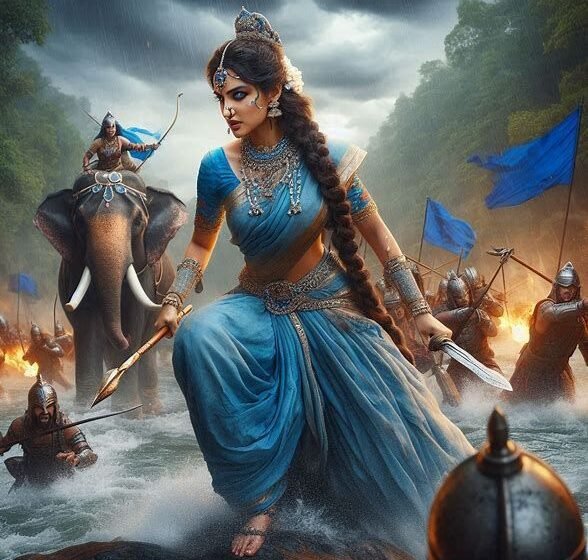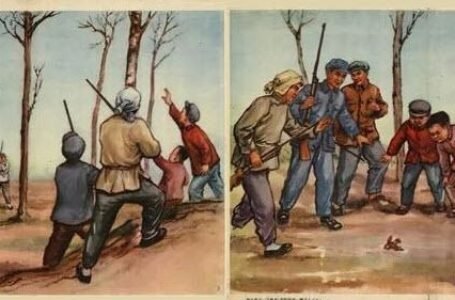Avishi: The Warrior Queen of Rigveda

-Mili Joshi
Avishi: The Warrior Queen of Rigveda
The Rigveda tells us many stories. Some are about gods and goddesses. Others are about brave humans. Among these stories, we find tales of warrior queens. One such queen was Avishi.
Who Was Avishi?
Avishi was a powerful queen in ancient India. She lived during the Vedic period. This was thousands of years ago. The Rigveda mentions her name with great respect.
She was not just any ordinary queen. Avishi was a warrior. She led armies into battle. She fought for her people and her land. Her name means “protector” in Sanskrit.
The Vedic Period
The Vedic period was a special time in Indian history. It lasted from about 1500 BCE to 500 BCE. During this time, people composed the Vedas. These are sacred Hindu texts.
The Rigveda is the oldest of all the Vedas. It contains 1,028 hymns. These hymns tell us about life in ancient India. They speak of wars, kings, queens, and daily life.
Women had important roles in Vedic society. They could be rulers, warriors, and scholars. Avishi was one such remarkable woman.
Avishi’s Kingdom
Avishi ruled over a kingdom in northern India. Her territory was rich and fertile. Rivers flowed through her land. The soil was good for farming.
But her kingdom faced many threats. Other tribes wanted to capture her land. Raiders came from distant places. Avishi had to protect her people.
She built a strong army. Her soldiers were loyal and brave. They followed her into every battle. Under her leadership, they rarely lost a fight.
A Warrior’s Training
Avishi was trained in warfare from a young age. In Vedic times, both boys and girls learned to fight. They practiced with swords and bows. They learned to ride horses and drive chariots.
Avishi excelled in all these skills. She could shoot arrows with perfect aim. Her sword work was legendary. She could control war horses with ease.
She also studied strategy and tactics. A good warrior needed a sharp mind. Avishi learned to outthink her enemies. This made her victories even more complete.
The Great Battle
The most famous story about Avishi involves a great battle. Enemy tribes had joined forces against her. They brought thousands of warriors. Their goal was to destroy her kingdom completely.
Many people feared the worst. The enemy army was huge. But Avishi did not lose hope. She gathered her best generals. Together, they made a battle plan.
On the day of battle, Avishi wore golden armor. She carried a blessed sword. Her war chariot was decorated with symbols of victory. She looked like a goddess of war.
Leading from the Front
Unlike many rulers, Avishi fought alongside her soldiers. She did not hide in safety. She led from the front lines. This inspired her troops greatly.
When the battle began, Avishi charged first. Her war cry echoed across the battlefield. Her soldiers followed her with fierce determination. The enemy was shocked by their courage.
The battle lasted for many hours. Both sides fought bravely. But Avishi’s leadership made the difference. Her tactical skills turned the tide of war.
Victory and Its Aftermath
Avishi’s army won the great battle. The enemy forces were defeated completely. Many enemy warriors fled in fear. Others surrendered and asked for mercy.
Avishi showed wisdom in victory. She did not seek revenge. Instead, she offered peace to her enemies. She allowed them to return to their homes safely.
This merciful act made her famous. Other kingdoms heard about her generosity. They realized she was not just a fierce warrior. She was also a wise and just ruler.
Beyond the Battlefield
Avishi’s greatness extended beyond warfare. She was an excellent administrator. Her kingdom prospered under her rule. Trade flourished. Arts and crafts developed.
She built schools and temples. She encouraged learning and scholarship. Many poets and sages visited her court. They composed hymns in her honor.
She also cared deeply for her people’s welfare. She ensured there was enough food for everyone. She built hospitals for the sick. Water systems brought clean water to all villages.
Women’s Status in Vedic Times
Avishi’s story shows us something important. Women in Vedic times had real power. They could rule kingdoms and lead armies. Society respected their abilities.
The Rigveda mentions several other warrior queens. There was Vishpala, who had a metal leg. Queen Mudgalani was another famous warrior. These women inspired generations of others.
This was very different from later periods. In medieval times, women had fewer rights. But in Vedic India, they could achieve greatness in any field.
Religious Significance
Avishi was not just a political leader. She also had religious importance. She performed sacred rituals for her people. She organized great festivals and ceremonies.
The Rigveda describes her as blessed by the gods. They gave her strength in battle. They granted her wisdom in peace. Her victories were seen as divine favor.
She built many temples in her kingdom. She supported priests and scholars. Under her patronage, religious learning flourished. New hymns and prayers were composed.
Legacy and Influence
Avishi’s influence lasted long after her death. Other queens looked to her as an example. They tried to follow her model of leadership.
Stories about her spread throughout India. Bards sang about her victories. Her name became synonymous with courage and wisdom.
Even today, her story inspires people. Modern women leaders often reference her example. She shows that leadership has no gender boundaries.
Archaeological Evidence
Historians have found some evidence of Avishi’s existence. Ancient weapons and armor have been discovered. Some bear inscriptions mentioning her name.
Ruins of fortified cities match descriptions in the Rigveda. These might have been part of her kingdom. More research continues to uncover new facts.
Archaeological finds support the Rigveda’s accounts. They show that powerful women rulers did exist in ancient India.
Lessons for Today
Avishi’s story teaches us many lessons. First, true leadership requires courage. She never backed down from challenges. She faced every threat head-on.
Second, wisdom matters as much as strength. Avishi won through smart planning. She outthought her enemies before outfighting them.
Third, mercy in victory shows true nobility. Avishi could have crushed her enemies completely. Instead, she chose compassion. This earned her lasting respect.
Finally, a good leader serves their people. Avishi fought not for glory but for her kingdom’s welfare. Everything she did benefited her subjects.
Conclusion
Avishi stands as one of history’s greatest warrior queens. Her story in the Rigveda inspires us even today. She proved that leadership knows no boundaries.
In an age of constant warfare, she brought peace through strength. In times of chaos, she provided stability through wisdom. Her legacy reminds us that true greatness comes from serving others.
The warrior queen of the Rigveda shows us what human potential can achieve. Her story continues to inspire leaders around the world. Avishi’s name will forever symbolize courage, wisdom, and noble leadership.


